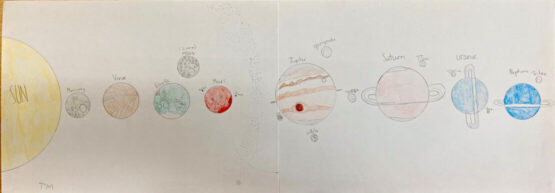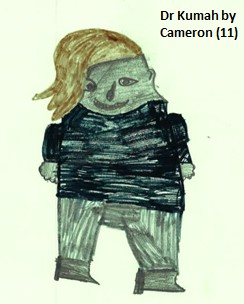 Picture drawn by Teddy (10) – One of Teddy’s main areas of interest is astronomy and the solar system. He is incredibly knowledgeable in this subject but also a great artist with a brilliant eye for detail.
Picture drawn by Teddy (10) – One of Teddy’s main areas of interest is astronomy and the solar system. He is incredibly knowledgeable in this subject but also a great artist with a brilliant eye for detail.
RDASH have three Neurodevelopmental Assessment services across the trust. These services are based in Rotherham, Doncaster and North Lincs. Please see the individual pages for more details on their specific referral process, team members and linked local services.
Rotherham and Doncaster also provide post diagnostic Attention Hyperactivity Deficit Disorder support. In North Lincs referrals are made to the Consultant Paediatrician or Attention Hyperactivity Deficit Disorder nurses following diagnosis who oversee the post diagnostic Attention Hyperactivity Deficit Disorder support.
All three services celebrate neurodiversity and encourage a focus on strengths as well as recognising vulnerabilities and the need for appropriate support and reasonable accommodations to ‘enable’ achievements.
The teams are multi-disciplinary and work closely with partner agencies such as education, social care and parenting forums.
We provide:
- Diagnostic assessments for autism and Attention Hyperactivity Deficit Disorder
- Provide recommendations that support the needs and recognise the strengths of children and young people
- Psychoeducation for Autism Spectrum Disorder and Attention Hyperactivity Deficit Disorder
- Signposting for additional support to our partner agencies and other organisations
- Support to other CAMHS pathways if needed, where concerns regarding mental health and emotional well-being are identified
- Medication to support Attention Hyperactivity Deficit Disorder – Rotherham and Doncaster
- Behavioural strategies for Attention Hyperactivity Deficit Disorder – Rotherham and Doncaster
- Referral on to the Community Paediatric team in North Lincolnshire for medication support and behavioural advice following an Attention Hyperactivity Deficit Disorder diagnosis
What is an Autism Spectrum Disorder?
Autism Spectrum Disorder describes a set of specific strengths and difficulties that may affect how your child learns, communicates and builds relationships with others. It is a life-long condition and it affects how your child makes sense of the world around them. Whilst two children may have similar difficulties their Autism Spectrum Disorder may also affect them in very different ways. Please find below a link to the National Autistic Society for more information
The National Autistic Society website has more information on what Autism is and provides useful information and tips for various factors, such as communication, behaviour, Education, transition and adult life. The website provides information on their services, for example their specialist schools, support in mainstream schools, community support, home and work life support. There is also information on conferences and training events for professionals.
What is an Attention Hyperactivity Deficit Disorder?
 If your child has Attention Hyperactivity Deficit Disorder they may have lots of energy and find it difficult to concentrate. They may get distracted very easily and find it hard to control their speech and actions. Attention Hyperactivity Deficit Disorder is one of the most common childhood disorders and can continue through adolescence and into adulthood. Symptoms often become noticeable between the ages of 3-7 years.
If your child has Attention Hyperactivity Deficit Disorder they may have lots of energy and find it difficult to concentrate. They may get distracted very easily and find it hard to control their speech and actions. Attention Hyperactivity Deficit Disorder is one of the most common childhood disorders and can continue through adolescence and into adulthood. Symptoms often become noticeable between the ages of 3-7 years.
A related condition Attention Deficit Disorder has similar difficulties however it doesn’t involve constant movement and fidgeting and the main problem is a difficulty concentrating.
The Attention Hyperactivity Deficit Disorder Foundation Neurodiversity Charity website has more information on what Attention Hyperactivity Deficit Disorder is and provides useful resources and tips to help parents and carers, and young people understand and cope with an Attention Hyperactivity Deficit Disorder diagnosis. The website also provides links to training courses and other events for families, teachers and other professionals.
Attention Hyperactivity Deficit Disorder Foundation Neurodiversity Charity